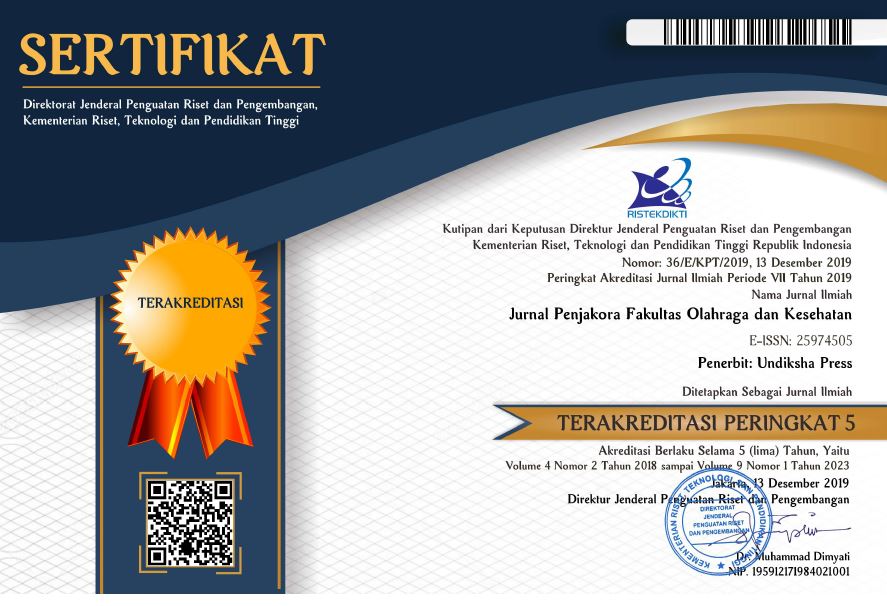Aksiologi Penggunaan VAR Dalam Industri Olahraga
DOI:
https://doi.org/10.23887/penjakora.v8i2.32171Kata Kunci:
aksiologi, VAR, olahragaAbstrak
Penggunaan VAR dalam dunia olahraga sangat penting. Tujuan penelitian ini adalah untuk mengetahui aksiologi penggunaan VAR dalam industri olahraga. Penelitian ini merupakan jenis penelitian studi literatur. VAR di gunakan sebagai pembantu dari kerja seoang wasit dalam memimpin pertandingan. Ketika terjadi sebuah keputusan wasit yang di anggap kontroversial para pengawas VAR akan memberitahukan informasi langsung kepada wasit melalui radio speaker dan jika wasit belum mendapatkan informasi yang jelas, wasit pun akan memeriksa melalui monitor pengawas yang ada di sisi lapangan. Dengan hadirnya VAR jelas akan mengurangi angka keputusan kontroversial dari seorang wasit.
Referensi
Abduljabar. (2012). Pendidikan Jasmani. Jurnal Pendidikan Jasmani, 1(2), 1–6. Retrieved from http://file.upi.edu/Direktori/FPOK/JUR._PEND._OLAHRAGA/196509091991021-BAMBANG_ABDULJABAR/Pengertian_Penjas.pdf
Adi, S. (2018). Landasan Pengembangan Sekolah Olahraga. Malang: Wineka Media.
Bagus, L. (2015). Kamus Filsafat. Jakarta: Gramedia.
Carlos, L.-P., Ezequiel, R., & Anton, K. (2019). How does Video Assistant Referee (VAR) modify the game in elite soccer? International Journal of Performance Analysis in Sport, 19(4), 1–9. https://doi.org/10.1080/24748668.2019.1646521
Kemenpora. (2005a). Undang Undang No.3 Tahun 2005 Tentang System Keolahragaan Nasional. Jakarta: Kemenpora RI Biro Humas dan Biro Hukum.
Kemenpora. (2005b). Undang Undng No. 4 Tahun 2005 Tentang Ketentuan Umum Keolahragaan. Jakarta: Kemenpora RI Biro Humas dan Biro Hukum.
Kristiyandaru. (2015). Manajemen Pendidikan Jasmani dan Olahraga. Surabaya: Unesa university press.
Peers, D. (2017). Engaging Axiology: Enabling Meaningful Transdisciplinary Collaboration in Adapted Physical Activity. Journal Human Kinetics, 35(3), 267–284. https://doi.org/10.1123/apaq.2017-0095
Setyawan, D. A. (2016). Faiz Play Dalam Olahraga. Jurnal Jendela Olahraga, 1(1), 1–13. https://doi.org/10.26877/jo.v1i1%20Juli.1097
Sumaryanto. (2016). Aksiologi Olahraga Dalam Perspektif Pengembangan Karakter Bangsa. Yogyakarta: UNY Press.
Taks, M., Green, B. C., Misener, L., & Chalip, L. (2014). Evaluating sport development outcomes: the case of a medium-sized international sport event. European Sport Management Quarterly, 12(3), 213–237. Retrieved from 10.1080/16184742.2014.882370
Ugondo, P. I., & Tsokwa, M. (2019). nterpreting Video Assistant Referee and Goal-Line Technology Communication: The Pitch-Based Referees Perspectives. International Journal of Trend in Scientific Research and Development, 3(4), 2456–6470. https://doi.org/10.31142/ijtsrd23914
Utama, I. G. B. R. (2013). Filsafat Ilmu dan Logika. Badung: Universitas Dhyana Pura.
Unduhan
Diterbitkan
Terbitan
Bagian
Lisensi
Authors who publish with the JURNAL PENJAKORA agree to the following terms:
- Authors retain copyright and grant the journal the right of first publication with the work simultaneously licensed under a Creative Commons Attribution License (CC BY-SA 4.0) that allows others to share the work with an acknowledgment of the work's authorship and initial publication in this journal.
- Authors are able to enter into separate, additional contractual arrangements for the non-exclusive distribution of the journal's published version of the work (e.g., post it to an institutional repository or publish it in a book), with an acknowledgment of its initial publication in this journal.
- Authors are permitted and encouraged to post their work online (e.g., in institutional repositories or on their website) prior to and during the submission process, as it can lead to productive exchanges, as well as earlier and greater citation of published work. (See The Effect of Open Access)







